词汇前缀和后缀
高中阶段英语词汇(必背)专题 - 前后缀核心词汇

高中词汇专题(一)前后缀核心词汇本篇核心内容:一、后缀:名词、形容词、副词、动词后缀二、前缀:a-/bi-/co-/dis-/in(im)-/inter-/un-/non-/re-/fore-/tele-/ mid-/semi-/micro-/mis-/super-/ir-一、后缀:(一)名词后缀1、-er,-or,-eer,ress,er,ee 构成表示人或事物的名词2、-ist 人、主义者3、-ism 主义4、-ese (……地方的)人、语言5、-an(-ian)(……地方的)人6、-(t)ion(ation)动作;状态7、-ment运动;结果8、-ice性质;状态9、-ness状态;性质10、-th结果;过程11、-dom状态12、-hood身份13、-craft工艺14、-ure结果15、-age抽象名词的词尾16、-ship情况;状态;技巧;身份17、ce、ance、ence状态18、-(e)ry性质19、-ing性质;行为20、-al行为21、-ity、ty抽象名词(二)形容词后缀22、-ing具有…的特征24、-al(ual)…的25、-ful充满27、-some有…倾向的28、-less无29、-able(ible)可…的;能…的30、-an(-ian)…(地、人)的31、-en …的32、-ive 倾向33、-ic(-ical)…的34、-y性质35、-ly品质;…的36、-ous多…的;有…特性的(三)副词后缀37、-ly后缀38、-ward(s)方向39、-way(s)方向(四)动词后缀40、-en构成动词41、-fy构成动词42、-ize构成动词二、前缀:1、a-构成形容词或副词2、bi-双3、co-共同5、in(im)-表否定6、inter-相互8、non-表否定9、re-再、重复10、fore-先、预11、tele-远12、mid-中13、semi-半14、micro-小15、mis-误16、super-超级的17、ir-不(表否定)。
常用英语单词前后缀

常用英语单词前后缀现代英语词源组成:拉丁语28%+ 古法语28%+ 古英语(日耳曼语源)25%+希腊语5.3%+ 其它拉丁词汇:包括现代科技拉丁词汇,通常代表更加优雅或更能显示专业造诣。
大多数拉丁语源的单词通常用在更加正式的讲话和文章中,比如法庭发言或者编写百科全书。
在医学、化学等的许多术语也为拉丁语词源。
日耳曼语源字汇:主要来源于古英语(包括一切基本字汇,如代词、连词等)大部分所用到的词汇一般是日耳曼语源,相对来说更短、更非正式。
前缀一.前缀re-re-是最常用的前缀之一。
它可以加在名词或动词前面,构成新的名词或动词。
re-表示以下三方面的意义:1. 表示”回"或”向后”的意思。
例如:return (回来,返回)recall(回忆,召回)retract (缩回,取回)react反应2 .表示"再"、"重新"、"重复"的意思。
例如:review (复习)reunion (团圆,重聚)class reunion同学会restart (重新开始)reconstruction (重建)3 .表示”相反”、"反对”的意思。
例如:rebel (反叛,谋反)reverse ([ UNO】反转,颠倒)resist (反抗,抵抗)二.前缀de-与dis-前缀de-来自拉丁语,意为"away from",所以这个前缀的意义之一就是"离开" 、"出" 。
它构成的词有一定规律性,常表"离开”这一深层概念,而且常与介词from等搭配,例如:dethrone(废黜)deport (驱逐出境)deduce (推断)derail (脱轨)deform(变形)Delete his name from the list of members .把他的名字从成员名单上除去。
The train will depart from platform 2 .这列火车将从2 号站台发车。
英语学习必背62个前缀和52个后缀

一、常用前缀
1、aero:concerning the air or aircraft
plane( 飞机)—aeroplane(飞机)
space(空间, 间隔)—aerospace(航空宇宙)
aerogram aerometer aeromedicine
7、by—:less important
product(产品, 产物,)—by-product(副产品, 附加产物)
way(路,道路)—byway(小道)
by-effect by-business bytime
8、centi: hundredth part
gra15、counter:opposite
act(担当,表现, 见效)—counteract(抵消, 中和, 阻碍)
attack(攻击)—counterattack(反引力)
counter—terrorist countereffect
16、cross:across;going between the stated things and joining them
minipark ministate
37、mis:bad or badly;wrong or wrongly
fortune( 运气, 好运)—misfortune(不幸, 灾祸)
14、cor:(used before r) together, with
relate(叙述, 讲, 使联系, 发生关系)—correlate(使相互关联,和...相关)
respond(回答, 响应, 作出反应,有反应)—correspond(符合, 协调, 通信, 相当, 相应)
英语前后缀归纳(详细版)

英语前后缀归纳(详细版)2、pre-加在名词,形容词和动词前:preheat(预热)、n(预防)、premature(过早的)3、fore-加在名词,形容词和动词前:foresee(预见)、XXX(祖先)、forehead(前额)4、pro-加在名词,形容词和动词前:proactive(积极主动的)、prosperous(繁荣的)、proceed(继续进行)5、ante-加在名词前:XXX(前事)、XXX(前厅)、antedate(先于)三、表示“后after”的前缀1、post-加在名词,形容词和动词前:postgraduate(研究生)、postpone(推迟)、ar(战后的)2、after-加在名词,形容词和动词前:aftermath(后果)、afternoon(下午)、XXX(事后想法)后缀一、名词后缀1、-ment:表示“状态,行为或结果”,如:enjoyment(享受)、agreement(协议)、movement(运动)2、-ness:表示“状态或品质”,如:happiness(幸福)、kindness(友善)、darkness(黑暗)3、-ity:表示“状态或品质”,如:reality(现实)、XXX(平等)、diversity(多样性)4、-XXX:表示“行为或过程”,如:XXX(教育)、XXX(交流)、XXX(竞争)5、-er/-or:表示“人或物”,如:XXX(教师)、actor(演员)、doctor(医生)二、形容词后缀1、-ful:表示“充满的”,如:colorful(色彩斑斓的)、wonderful(神奇的)、helpful(有帮助的)2、-less:表示“没有的”,如:hopeless(无望的)、useless(无用的)、fearless(无畏的)3、-able/-ible:表示“能够的”,如:comfortable(舒适的)、flexible(灵活的)、visible(可见的)4、-al/-ial:表示“关于的”,如:nal(国家的)、financial(金融的)、social(社会的)5、-ous/us:表示“有…性质的”,如:famous(著名的)、us(美味的)、us(好奇的)1.Pre- means before。
英语单词常用前缀和后缀
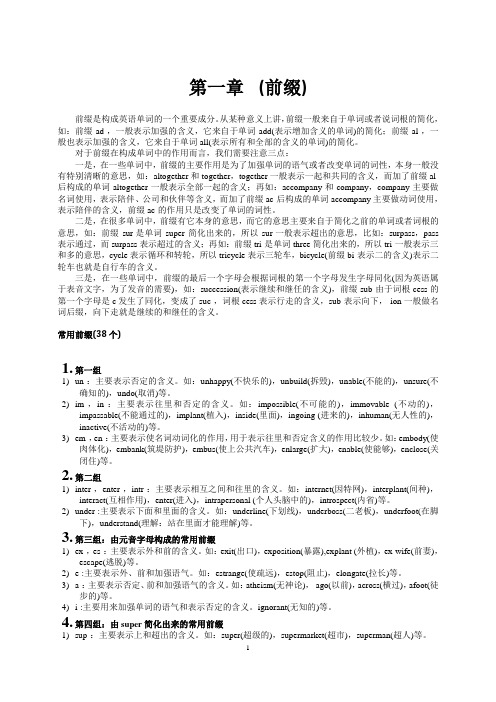
第一章(前缀)前缀是构成英语单词的一个重要成分。
从某种意义上讲,前缀一般来自于单词或者说词根的简化,如:前缀ad-,一般表示加强的含义,它来自于单词add(表示增加含义的单词)的简化;前缀al-,一般也表示加强的含义,它来自于单词all(表示所有和全部的含义的单词)的简化。
对于前缀在构成单词中的作用而言,我们需要注意三点:一是,在一些单词中,前缀的主要作用是为了加强单词的语气或者改变单词的词性,本身一般没有特别清晰的意思,如:altogether和together,together一般表示一起和共同的含义,而加了前缀al-后构成的单词altogether一般表示全部一起的含义;再如:accompany和company,company主要做名词使用,表示陪伴、公司和伙伴等含义,而加了前缀ac-后构成的单词accompany主要做动词使用,表示陪伴的含义,前缀ac-的作用只是改变了单词的词性。
二是,在很多单词中,前缀有它本身的意思,而它的意思主要来自于简化之前的单词或者词根的意思,如:前缀sur-是单词super简化出来的,所以sur-一般表示超出的意思,比如:surpass,pass 表示通过,而surpass表示超过的含义;再如:前缀tri-是单词three简化出来的,所以tri-一般表示三和多的意思,cycle表示循环和转轮,所以tricycle表示三轮车,bicycle(前缀bi-表示二的含义)表示二轮车也就是自行车的含义。
三是,在一些单词中,前缀的最后一个字母会根据词根的第一个字母发生字母同化(因为英语属于表音文字,为了发音的需要),如:succession(表示继续和继任的含义),前缀sub-由于词根cess的第一个字母是c发生了同化,变成了suc-,词根cess表示行走的含义,sub-表示向下,-ion一般做名词后缀,向下走就是继续的和继任的含义。
常用前缀(38个)1.第一组1)un-:主要表示否定的含义。
英语前缀后缀

英语前缀后缀摘要:1.英语前缀和后缀的定义与作用2.常见英语前缀及其含义3.常见英语后缀及其含义4.英语前缀后缀的运用与实例5.学习英语前缀后缀的意义和方法正文:英语前缀和后缀是英语词汇构成的重要组成部分,它们对于词汇的含义和词性的变化起着至关重要的作用。
英语前缀是指加在词首的词素,它可以改变词汇的含义。
常见的英语前缀有:un-(不,非),pre-(在…之前),in-(不,非),anti-(反对,抵制),inter-(在…之间)等。
例如,"unhappy"(不开心的)中的"un-"就表示否定含义,"preheat"(预热)中的"pre-"表示动作发生在某个过程之前,"incorrect"(不正确)中的"in-"则表示否定。
英语后缀则是加在词尾的词素,它可以改变词汇的词性。
常见的英语后缀有:-ful(充满),-able(能够),-less(没有),-ness(状态,性质),-ment(行为,结果),-tion(行为,结果)等。
例如,"happy"(快乐的)加上后缀"-ful"变为"happiful"(充满快乐的),"able"(能够)加上后缀"-able"变为"ability"(能力),"less"(没有)加上后缀"-less"变为"homeless"(无家可归的)。
英语前缀后缀的运用可以使英语词汇更加丰富和灵活,是英语学习者必须掌握的知识点。
在实际应用中,我们可以通过添加前缀和后缀来创造新的词汇,也可以通过理解前缀后缀的含义来更好地理解词汇和句子。
学习英语前缀后缀对于英语学习者来说非常重要,它可以帮助我们更好地理解和使用英语,提高我们的英语水平。
常用前缀和后缀
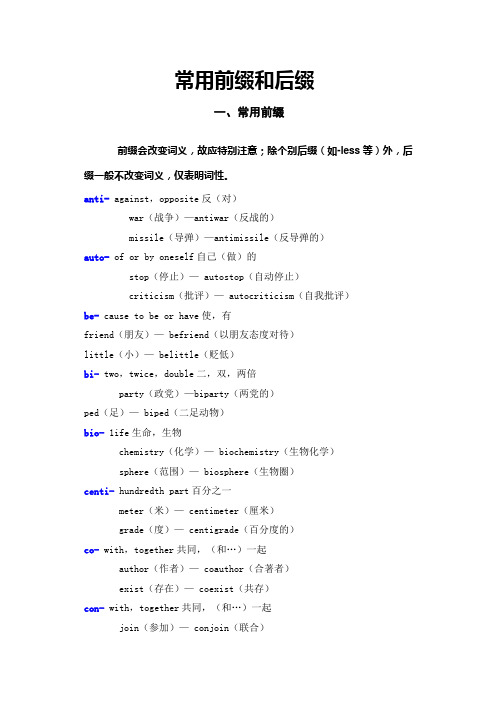
常用前缀和后缀一、常用前缀前缀会改变词义,故应特别注意;除个别后缀(如-less等)外,后缀一般不改变词义,仅表明词性。
anti- against,opposite反(对)war(战争)—antiwar(反战的)missile(导弹)—antimissile(反导弹的)auto- of or by oneself自己(做)的stop(停止)— autostop(自动停止)criticism(批评)— autocriticism(自我批评)be- cause to be or have使,有friend(朋友)— befriend(以朋友态度对待)little(小)— belittle(贬低)bi-two,twice,double二,双,两倍party(政党)—biparty(两党的)ped(足)— biped(二足动物)bio- 1ife生命,生物chemistry(化学)— biochemistry(生物化学)sphere(范围)— biosphere(生物圈)centi- hundredth part百分之一meter(米)— centimeter(厘米)grade(度)— centigrade(百分度的)co- with,together共同,(和…)一起author(作者)— coauthor(合著者)exist(存在)— coexist(共存)con- with,together共同,(和…)一起join(参加)— conjoin(联合)centric(中心的)— concentric(同中心的)col-(用在字母l的前面)location(位置)— collocation(并置)collect 收集com-(用在字母m, b, p的前面)passion(激情)— compassion(同情)combine结合,联合cor-(用在字母r的前面)relation(关系)— correlation(相互关系)correct改正contra- opposite反对,相反,相对contradiction矛盾missile(导弹)— contramissile(反弹道导弹度)natural(自然的)— contranatural(违反自然的)counter- opposite反对,相反,相对act(起作用)— counteract对…起反作用attack(攻击)— counterattack(反攻)de-showing an opposite,to remove,to reduce非,相反,除去,减少 code(密码)— decode(解码)value(价值)— devalue(使贬值)dis- not,the opposite of否定,相反agree(同意)— disagree(反对)honest(诚实的)— dishonest(不诚实的)e- , ef-out出,外(为ex-的变异形式)lect(选)— elect(选举)ject(投,掷)—eject(驱逐;喷射;弹出)fect(做)— effect 结果,效果en-, em- cause to become,put into the stated condition使成为,使处于…状态large(大的)— enlarge(扩大)body(身体)— embody(体现)ex- 1. out 出,外exit 出口2. former以前的,前任的minister(部长)—ex-minister(前任部长)wife(妻子)— ex-wife(前妻)extra- outside,beyond超出,在…之外ordinary(普通的)— extraordinary(非常的)vert(转)— extravert性格外向的人fore- in advance,before,in or at the front预先,前,在前面的see(看)— foresee(预见)leg(腿)— foreleg(前腿)in-,i1-, im- , ir- not不,非,无(字母l前用il-;字母m, b, p前用im-;字母r前用ir-)direct(直接的)— indirect(间接的)infant婴儿legal(合法的)— illegal(非法的)balance(平衡)— imbalance(不平衡)moral(道德的)— immoral(不道德的)possible(可能的)— impossible(不可能的)regular(规则的)— irregular(不规则的)in- in, into内,向内door(门)— indoor(室内的)inter- between,among互相,在…之间national(国家的)— international(国际的)intra- inside, within在之内city(城市)— intracity(市内的)kilo- thousand千gram(克)— kilogram(千克,公斤)meter(米)— kilometer(千米)macro-large大的,宏观的economics(经济学)— macroeconomics(宏观经济学)mal- bad, badly坏,不良,不当function(功能)— malfunction(机能障碍)treat(对待)— maltreat(虐待)micro- extremely small极小的computer(计算机)— microcomputer(微型计算机)microscope 显微镜mid- middle中间day(昼,白天)— midday(中午)night(夜晚)— midnight(午夜)mini- small,short极小的,极短的bus(公共汽车)— minibus(小汽车)skirt(裙子)— miniskirt(超短裙)mis- bad,badly坏,不当understand(理解)— misunderstand(误解)lead(引导)— mislead(使误入歧途)mono- one, single单,一log(说)— monologue(独白)tone(音调)— monotone单调multi- many, more than one多national(国家的)— multinational(多国的)non- not不,非,无metal(金属)— non-metal(非金属)governmental(政府的)— non-governmental(非政府的)out-outside,beyond超越,超过,胜过;在[向]外(的)live(生活)— outlive(比…活得长)number(数量)— outnumber(在数量上超过)door(门)— outdoor(户外的)over- too much,above,additional过分,在…上面,额外的head(头)— overhead(在头顶上的)population(人口)— overpopulation(人口过剩)time(时间)— overtime(加班)poly- many多gene(基因)— polygene(多基因)centric(中心)— polycentric(多中心的)post- later than,after在…之后graduate(有学士学位的)— postgraduate(研究生的)war(战争)— postwar(战后的)pre- before,in advance在…之前,预先view(观看)— preview(预演)dict(说)— predict(预言)pseudo- not real,false假,伪memory(记忆)— pseudomemory(记忆错误)science(科学)— pseudoscience(伪科学)re-again,back to a former state再,回复view(看)— review(复习)call(叫,呼唤)— recall(回忆起,叫回)semi- half,partly半,部分的circle(圆)— semicircle(半圆)final(决赛)— semifinal(半决赛)sub- under,below,less important在…下,低于,次于…的marine(海洋的)— submarine(海底的;潜水艇)way(路)— subway(地铁)super-greater or more than, above, beyond or over 超级,超过;在…之上market(市场)— supermarket(超级市场)natural(自然的)— supernatural(超自然的)vis(看)— supervise(监督)tele- at or over a long distance,by or for television远(距离),由(或为)电视vis(看)— television(电视)screen(屏幕)— telescreen(电视屏幕)therm-, thermo- heat热chemistry(化学)— thermochemistry(热化学)meter(仪表)— thermometer(温度计)trans- across,on or to the other side of横越Atlantic(大西洋)— transatlantic(横越大西洋的)plant(种植)— transplant(移植)tri- three三angle(角)— triangle(三角形)cycle(圆圈)— tricycle(三轮摩托车)ultra- beyond,very,too超过,极度的high(高的)— ultrahigh(超高的)sound(声音)— ultrasound(超声)un- not不,非fortunately(幸运地)— unfortunately(不幸地)usual(平常的)— unusual(不平常的)under- too little,below过少,在…下面development(发展)— underdevelopment(欠发达)sea(大)— undersea(海底的)uni-one,single单,一form(形式)— uniform(制服)sex(性别)— unisex(不分男女的)vice- next in rank below副president(总统)— vice-president(副总统)chairman(主席)— vice-chairman(副主席)二、常用后缀1、名词后缀-ability, -ibilityable(能够的)— ability(能力)possible(可能的)— possibility(可能性)-agepost(邮政)— postage(邮资)shrink(收缩)— shrinkage(收缩)-alarrive(到达)— arrival(到达)refuse(拒绝)— refusal(拒绝)-an, -ian, -arianhumane(人道的)— humanitarian(人道主义者)library(图书馆)— librarian(图书管理员)music(音乐)— musician(音乐家)-ance, -encyappear(出现)— appearance(出现)refer(参考)— reference(参考)-ancy, encyemerge(出现)— emergency(紧急情况)expect(期待)— expectancy(期待)-ant, -entserve(服务)— servant(仆人)study(学习)— student(学生)-cyaccurate(准确的)— accuracy(准确性)bankrupt(破产的)— bankruptcy(破产)-domfree(自由的)— freedom(自由)king(国王)— kingdom(王国)-eeemploy(雇用)— employee(雇员)absent(缺席)— absentee(缺席者)-er, -or, -arlead(指引)— leader(领袖)conduct(传导)— conductor(导体)beg(乞讨)— beggar(乞丐)-erybrave(勇敢的)— bravery(勇敢)cook(烹调)— cookery(烹饪法)nurse(照料)— nursery(托儿所)-eseChina(中国)—Chinese(汉语,中国人) Japan(日本)— Japanese(日语,日本人)-essactor(演员)— actress(女演员)lion(狮子)— lioness(母狮)-fulhand(手)— handful(一把的量)spoon(匙)— spoonful(一匙的量)-hoodchild(孩子)— childhood(童年)neighbor(邻居)— neighborhood(邻近地区)-icselectron(电子)— electronics(电子学)linguist(语言学家)— linguistics(语言学)-ion, -ition, -ationcollect(收集)— collection(收集)compose(创作)— composition(作文)observe(观察)— observation(观察)-ismhero(英雄)— heroism(英雄主义)social(社会的)— socialism(社会主义)-istsocial(社会的)— socialist(社会主义者)art(艺术)— artist(艺术家)-ity, -tycruel(残忍的)— cruelty(残忍)pure(纯的)— purity(纯净)-mentmove(运动)— movement(运动)apart(分离的)— apartment(一套公寓房间)govern(统治)— government(政府)-nessdark(黑暗的)— darkness(黑暗)happy(幸福的)— happiness(幸福)-ology, -logybio(生物)— biology(生物学)climate(气候)— climatology(气候学)-shipfriend(朋友)— friendship(友谊)member(会员)— membership(会员身份)-siondecide(决定)— decision(决定)conclude(结束)— conclusion(结论)-urefail(失败)— failure(失败)pict(标记)— picture(画)2、动词后缀-endeep(深的)— deepen(加深)fast(牢固的)— fasten(扎牢)-ifyclass(种类)— classify(分类)simple(简单的)— simplify(简化)-ize, -isemodern(现代的)— modernize/-ise (使现代化)popular(流行的)— popularize/-ise(普及)3、形容词后缀-able, -iblesuit(适合)— suitable(合适的)horror(恐怖)— horrible(可怕的)-alcentre(中心)— central(中心的)nature(自然)— natural(自然的)-an, -arian, -ianElizabeth(伊丽莎白)— Elizabethan(伊丽莎白的)Christ(耶酥)— Christian(基督徒的)vegetal(植物的,蔬菜的)— vegetarian(素食者的,吃素的)-ant, -entdiffer(不同)— different(不同的)insist(坚持)— insistent(不断的)-ary, -oryelement(成分,要素)— elementary(基础的)contradict(与…相反)— contradictory(相反的,矛盾的)-ateconsider(考虑)— considerate(考虑周到的)fortune(运气)— fortunate(幸运的)-enwood(木头)— wooden(木头的)wool(羊毛)— woolen(羊毛的)-eseChina(中国)— Chinese(中国的)Japan(日本)— Japanese(日本的)-freecare(忧虑)— carefree(无忧无虑的)ticket(票)— ticketfree(不用票的)-fulbeauty(美))— beautiful(美丽的)shame(羞耻)— shameful(可耻的)hope(希望)— hopeful(有希望的)use(用)— useful(有用的)-ic, -icalalcohol(酒精)— alcoholic(酗酒的)music(音乐)— musical(音乐的)-ishfool(傻瓜)— foolish(愚蠢的)red(红色)— reddish(微红的)-ivedecide(决定)— decisive(果断的)create(创造)— creative(有创造力的)-lesshelp(帮助)— helpless(无助的)job(工作)— jobless(失业的)-likechild(孩子)— childlike(孩子般的)lady(贵妇)— ladylike(贵妇般的)-lyday(白天,日子)— daily(每日的,日常的) man(男人)— manly(有男子气概的)-ous, -iousdanger(危险)— dangerous(危险的)space(空间)— spacious(宽敞的)-somequarrel(吵架)— quarrelsome(喜欢吵架的) trouble(烦恼)— troublesome(使人烦恼的)-warddown(向下)— downward(向下的)home(家)— homeward(回家的)-yhair(毛发)— hairy(多毛的)noise(喧闹声)— noisy(喧闹的)4、副词后缀-lyhappy(快乐的)— happily快乐地-ward, -wardseast(东)— eastward(s)(向东地) up(向上)— upward(s)(向上地)-wiselike(像)— likewise(同样地)other(其他)— otherwise(在其他方面)。
英语单词常见的前缀和后缀及例词
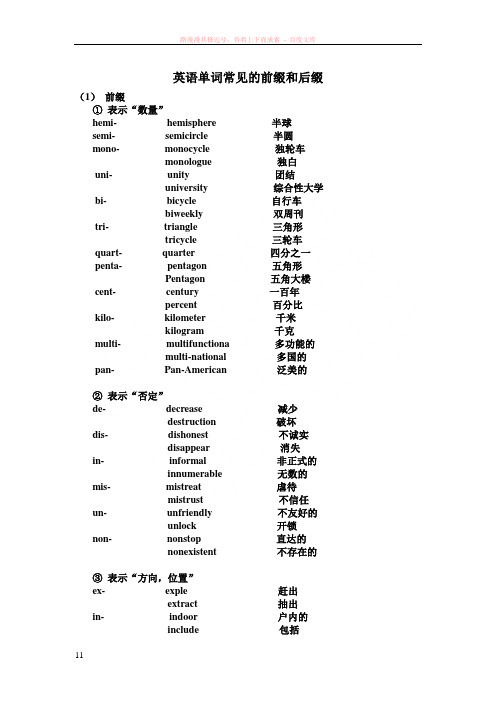
英语单词常见的前缀和后缀(1)前缀①表示“数量”hemi- hemisphere 半球semi- semicircle 半圆mono- monocycle 独轮车monologue 独白uni- unity 团结university 综合性大学bi- bicycle 自行车biweekly 双周刊tri- triangle 三角形tricycle 三轮车quart- quarter 四分之一penta- pentagon 五角形Pentagon 五角大楼cent- century 一百年percent 百分比kilo- kilometer 千米kilogram 千克multi- multifunctiona 多功能的multi-national 多国的pan- Pan-American 泛美的②表示“否定”de- decrease 减少destruction 破坏dis- dishonest 不诚实disappear 消失in- informal 非正式的innumerable 无数的mis- mistreat 虐待mistrust 不信任un- unfriendly 不友好的unlock 开锁non- nonstop 直达的nonexistent 不存在的③表示“方向,位置”ex- exple 赶出extract 抽出in- indoor 户内的include 包括inter- interview 会见interact 互相作用pro- propel 推进protrude 向前伸出sub- subway 地下铁道submarine 潜艇trans- transatlantic 横穿大西洋的transform 变革④表示“程度”extra(o)- extraordinary 非常的extracurricular 课外的mini- minibus 小面包车miniskirt 短裙out- outnumber 数量超过outlive 活得更长over- overwork 过度劳累overcharge 要价过高super- supersonic 超音速supermarket 超级市场under- underestimate 低估underdeveloped 不发达的⑤表示“时间先后”ex- ex-premier 前总理ex-husband 前夫fore- forehead 前额foresee 预见mid- midday 正午midterm 期中pre- precaution 预防措施prefix 前缀post- postpone 推迟postwar 战后⑥表示“方式”anti- antinuclear 反核antiaircraft 防空co- coexist 共存colleague 同事col- collaborate 合作collocate 并置com- compassion 同情combine 联合con- connect 连接contract 合同counter- counterattack 反攻counteract 抵消re- reunite 重新联合rebuild 重建⑦加在名词或形容词前使其变为动词,表示“使…”en- enable 使…能够endanger 使危险(2)后缀1)常见的名词后缀①表示“做某事的人或物”-ar scholar 学者liar 说谎的人-ari humanitarian 人道主义者vegetarian 素食者-er worker 工人wirter 作家-or sailor 水手educator 教育家-eer mountaineer 登山者engineer 工程师-man statesman 政治家artist 艺术家-ian technician 技术员historian 历史学家-ant inhabitant 居民participant 参加者-ent resident 居民president 总统②表示“场所”-ory dormitory 集体宿舍laboratory 实验室-ary liborary 图书馆depositary 存放处③表示“学科”-ics economics 经济学electronics 电子学-logy biology 生物学methodology 方法论④表示“抽象名词”-al removal 移动survival 幸存-ance appearance 出现assistance 援助-ence existence 存在difference 区别-hood manhood 成年likelihood 可能性-ion translation 翻译possession 拥有-ment agreement 同意development 发展-ness bitterness 苦难kindness 仁慈-ship hardship 苦难scholarship 奖学金-sure exposure 暴露pleasure 乐趣-th growth 成长depth 深度-ty safety 安全loyalty 忠诚2}常见的形容词后缀①表示“充满”、“多”-ful faithful 忠诚的meaningful 有意义的-ous prosperous 繁荣的courageous 有勇气的-y sleepy 想睡的bloody 流血的②表示“类似”-ish childish 幼稚的boyish 像男孩一样的-like childlike 孩子样的homelike 亲切的-ly manly 有男子气概的friendly 友好的-some troublesome 令人烦恼的fearsome 可怕的③表示“具有…性质的”-al vital 重要的governmental 政府的-ant vigilant 警惕的resistant 抵抗的-ar particular 特别的familiar 熟悉的-ary secondary 次要的customary 习惯的-ent insistent 坚持的confident 自信的-ial beneficial 友谊处的facial 面部的-ic historic 有历史意义的electronic 电子的-ory contradictory 矛盾的compulsory 强制性的④表示“主、被动意义”-able practicable 可行的dependable 可靠的-ible credible 可信的perceptible 可察觉的-ive protective 保护的instructive 有教育意义的⑤表示“由…制成的”-en wooden 木制的woolen 羊毛制的⑥表示“方向”-ern southern 南方的estern 东方的⑦表示“否定”-less careless 粗心的speechless 无语的sleepless 不眠的3)常见的动词性后缀表示“使成为¨”-ate artivate 使活跃concentrate 集中-en strengthen 加强deepen 加深-fy magnify 使放大classify 分类-ize modernize 使现代化materialize 使具体化4)常见的副词后缀“变形容词或名词为副词”-ly quickly 快速地carefully 细心地-ward forward 向前eastward 响东-wise clockwise 顺时针方向otherwise 否则。
英语单词词缀
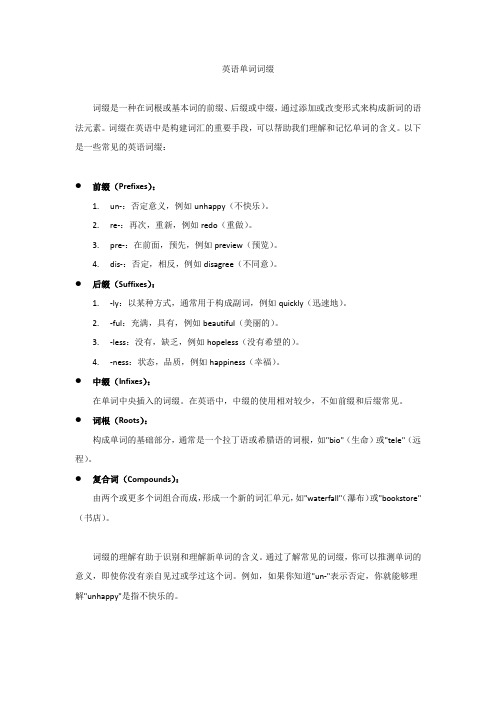
英语单词词缀词缀是一种在词根或基本词的前缀、后缀或中缀,通过添加或改变形式来构成新词的语法元素。
词缀在英语中是构建词汇的重要手段,可以帮助我们理解和记忆单词的含义。
以下是一些常见的英语词缀:●前缀(Prefixes):1.un-:否定意义,例如unhappy(不快乐)。
2.re-:再次,重新,例如redo(重做)。
3.pre-:在前面,预先,例如preview(预览)。
4.dis-:否定,相反,例如disagree(不同意)。
●后缀(Suffixes):1.-ly:以某种方式,通常用于构成副词,例如quickly(迅速地)。
2.-ful:充满,具有,例如beautiful(美丽的)。
3.-less:没有,缺乏,例如hopeless(没有希望的)。
4.-ness:状态,品质,例如happiness(幸福)。
●中缀(Infixes):在单词中央插入的词缀。
在英语中,中缀的使用相对较少,不如前缀和后缀常见。
●词根(Roots):构成单词的基础部分,通常是一个拉丁语或希腊语的词根,如"bio"(生命)或"tele"(远程)。
●复合词(Compounds):由两个或更多个词组合而成,形成一个新的词汇单元,如"waterfall"(瀑布)或"bookstore"(书店)。
词缀的理解有助于识别和理解新单词的含义。
通过了解常见的词缀,你可以推测单词的意义,即使你没有亲自见过或学过这个词。
例如,如果你知道"un-"表示否定,你就能够理解"unhappy"是指不快乐的。
前缀后缀汇总-概述说明以及解释
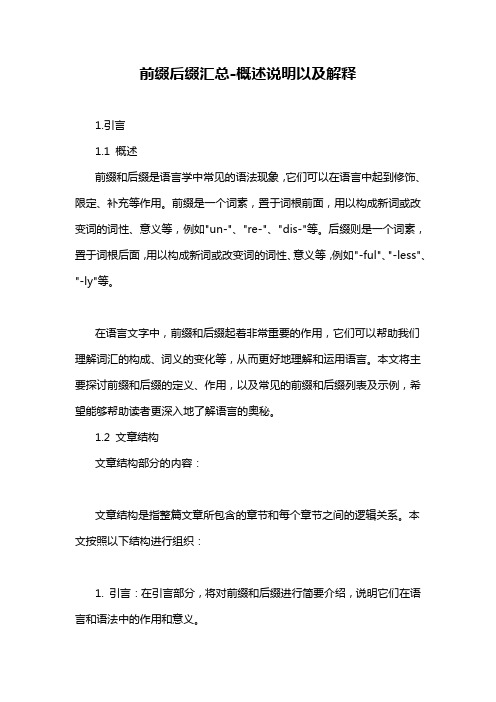
前缀后缀汇总-概述说明以及解释1.引言1.1 概述前缀和后缀是语言学中常见的语法现象,它们可以在语言中起到修饰、限定、补充等作用。
前缀是一个词素,置于词根前面,用以构成新词或改变词的词性、意义等,例如"un-"、"re-"、"dis-"等。
后缀则是一个词素,置于词根后面,用以构成新词或改变词的词性、意义等,例如"-ful"、"-less"、"-ly"等。
在语言文字中,前缀和后缀起着非常重要的作用,它们可以帮助我们理解词汇的构成、词义的变化等,从而更好地理解和运用语言。
本文将主要探讨前缀和后缀的定义、作用,以及常见的前缀和后缀列表及示例,希望能够帮助读者更深入地了解语言的奥秘。
1.2 文章结构文章结构部分的内容:文章结构是指整篇文章所包含的章节和每个章节之间的逻辑关系。
本文按照以下结构进行组织:1. 引言:在引言部分,将对前缀和后缀进行简要介绍,说明它们在语言和语法中的作用和意义。
2. 正文:正文部分将分为三个小节:- 前缀的定义与作用:解释前缀是什么,以及它们在语言中的作用和功能。
- 常见前缀列表及示例:列举一些常见的前缀,并给出相应的例子以便读者更好地理解。
- 前缀的应用领域:探讨前缀在不同领域中的应用情况,以及对语言和沟通的影响。
3. 结论:结论部分将总结前缀的重要性,并转入后缀的讨论。
在结论中,还将列举一些常见的后缀,并给出相应的示例,说明后缀在语言中的作用和意义。
通过以上的结构安排,读者可以更清晰地了解前缀和后缀在语言中的重要性和使用方法。
1.3 目的前缀和后缀在语言学中是非常重要的概念,它们可以帮助我们更好地理解词汇的构成和含义。
本文的目的旨在通过对前缀和后缀的详细介绍和解析,帮助读者更好地理解这两个概念的定义和作用,以及它们在实际应用中的重要性。
通过本文的阐述,读者可以更深入地认识前缀和后缀在语言学中的作用,从而加深对词汇构成和语言现象的理解和认识。
英语词汇前后缀
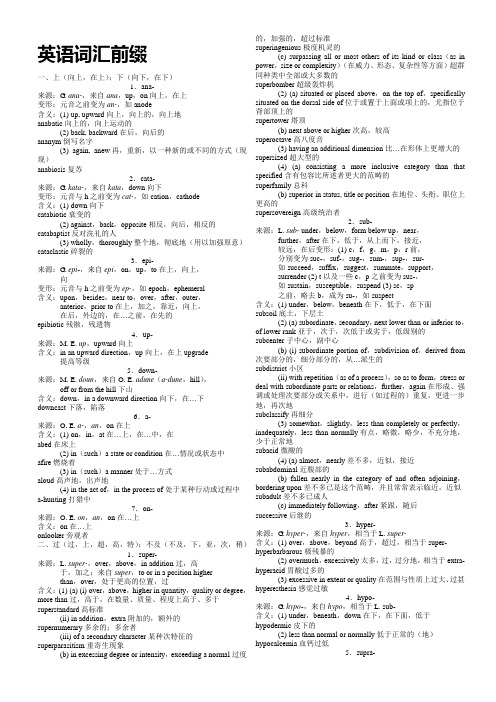
英语词汇前缀一、上(向上,在上);下(向下,在下)1.ana-来源:G. ana-,来自ana,up,on向上,在上变形:元音之前变为an-,如anode含义:(1) up, upward向上,向上的,向上地anabatic向上的,向上运动的(2) back, backward在后,向后的ananym倒写名字(3) again, anew再,重新,以一种新的或不同的方式(现现)anabiosis复苏2.cata-来源:G. kata-,来自kata,down向下变形:元音与h之前变为cat-,如cation,cathode含义:(1) down向下catabiotic衰变的(2) against,back,opposite相反,向后,相反的catabaptist反对洗礼的人(3) wholly,thoroughly整个地,彻底地(用以加强原意)cataclastic碎裂的3.epi-来源:G. epi-,来自epi,on,up,to在上,向上,向变形:元音与h之前变为ep-,如epoch,ephemeral含义:upon,besides,near to,over,after,outer,anterior,prior to在上,加之,靠近,向上,在后,外边的,在…之前,在先的epibiotic残骸,残遗物4.up-来源:M. E. up,upward向上含义:in an upward direction,up向上,在上upgrade提高等级5.down-来源:M. E. doun,来自O. E. adune(a-dune,hill),off or from the hill下山含义:down,in a downward direction向下,在…下downcast下落,陷落6.a-来源:O. E. a-,an,on在上含义:(1) on,in,at在…上,在…中,在abed在床上(2) in(such)a state or condition在…情况或状态中afire燃烧着(3) in(such)a manner处于…方式aloud高声地,出声地(4) in the act of,in the process of处于某种行动或过程中a-hunting打猎中7.on-来源:O. E. on,an,on在…上含义:on在…上onlooker旁观者二、过(过,上,超,高,特);不及(不及,下,亚,次,稍)1.super-来源:L. super-,over,above,in addition过,高于,加之;来自super,to or in a position higherthan,over,处于更高的位置,过含义:(1) (a) (i) over,above,higher in quantity,quality or degree,more than过,高于,在数量、质量、程度上高于、多于superstandard高标准(ii) in addition,extra附加的,额外的supernumerary多余的;多余者(iii) of a secondary character某种次特征的superparasitism重寄生现象(b) in excessing degree or intensity,exceeding a normal过度的,加强的,超过标准superingenious极度机灵的(c) surpassing all or most others of its kind or class(as in power,size or complexity)(在威力、形态、复杂性等方面)超群同种类中全部或大多数的superbomber超级轰炸机(2) (a) situated or placed above,on the top of,specifically situated on the dorsal side of位于或置于上面或项上的,尤指位于背部顶上的supertower塔顶(b) next above or higher次高,较高superoctave高八度音(3) having an additional dimension比…在形体上更增大的supersized超大型的(4) (a) consisting a more inclusive category than that specified含有包容比所述者更大的范畴的superfamily总科(b) superior in status, title or position在地位、头衔、职位上更高的supersovereign高级统治者2.sub-来源:L. sub- under,below,form below up,near,further,after在下,低于,从上而下,接近,较远,在后变形:(1) c,f,g,m,p,r前,分别变为suc-,suf-,sug-,sum-,sup-,sur-如succeed,suffix,suggest,summate,support,surrender (2) t以及一些c,p之前变为sus-,如sustain,susceptible,suspend (3) sc,sp之前,略去b,成为su-,如suspect含义:(1) under,below,beneath在下,低于,在下面subsoil底土,下层土(2) (a) subordinate,secondary,next lower than or inferior to,of lower rank亚于,次于,次低于或劣于,低级别的subcenter子中心,副中心(b) (i) subordinate portion of,subdivision of,derived from 次要部分的,细分部分的,从…派生的subdistrict小区(ii) with repetition(as of a process),so as to form,stress or deal with subordinate parts or relations,further,again在形成、强调或处理次要部分或关系中,进行(如过程的)重复,更进一步地,再次地subclassify再细分(3) somewhat,slightly,less than completely or perfectly,inadequately,less than normally有点,略微,略少,不充分地,少于正常地subacid微酸的(4) (a) almost,nearly差不多,近似,接近subabdominal近腹部的(b) fallen nearly in the category of and often adjoining,bordering upon差不多已是这个范畴,并且常常表示临近,近似subadult差不多已成人(c) immediately following,after紧跟,随后successive后继的3.hyper-来源:G. hyper-,来自hyper,相当于L. super-含义:(1) over,above,beyond高于,超过,相当于super- hyperbarbarous极残暴的(2) overmuch,excessively太多,过,过分地,相当于extra- hyperacid胃酸过多的(3) excessive in extent or quality在范围与性质上过大、过甚hyperesthesia感觉过敏4.hypo-来源:G. hypo-,来自hypo,相当于L. sub-含义:(1) under,beneath,down在下,在下面,低于hypodermic皮下的(2) less than normal or normally低于正常的(地)hypocalcemia血钙过低5.supra-来源:L. supra-,above,on,top,beyond,furtherback,earlier高于,在上,上端,超出,更后,较早含义:(1) above,higher than处于上部,高于supraorbital眼眶上的(2) transcending超越supranational超国家的(3) prior to先于supralapsarian前定论者6.infra-来源:L. infra,below,beneath低于,在下面含义:(1) below,lower in status than低于,地位低于infraglacial冰底的(2) within在…内infraterritorial本土内的(3) below in a scale or series在尺度或系列中处于下位的infrasonic次声(频)的(4) below or beneath低于,在下面infracoastal肋骨以下的7.subter-来源:L. subter,secretly,under,below隐蔽在,在下,低于含义:under,below,secretly在下,低于,隐蔽地subternatural逊于天然的8.sur-来源:O. F. sour-,sur-来自L. super含义:(1) over超,高于,加上,相当于super-surface表面(2) excessive过度的surexcitation兴奋过度(3) above,up在上,向上surbase基柱上的饰物9.over-来源:O. E. ofer,over在上,过于含义:(1) too过,太(尤用于来自形容词的形容词)overbold过于大胆的(2) too much过多(尤用于来自名词或动词的名词或动词)overact演得过火(3) over,on,outside在上,在外overshoe套鞋10.under-来源:O. E. under,under在下,少于含义:(1) worn,placed,situated,etc. under穿于下面,放在下面,位于下部等(尤用于名词之前)underclothes内衣裤(2) not sufficiently,not so much as necessary不足,比需要的少些(尤用于动词之前)underact不卖力的表演三、内(在内,向内,进内);外(在外,向外,出外)1.in-来源:L. in-,in在内,向内,进入变形:(1) 在b,m,p以前变成im-,如imbalance,immoral,import (2) 在l,r以前变成il-,ir-,如irrigate (3) 在gn前变成i-,如ignorance(4) 偶尔还可见其延伸式indu-,如industry含义:(1) in,within,inward,into,toward,on内,在内,向内,进入,向,在上inject投入,注射(2) 与en-同义,使…,加以…,饰以…,放进去,提供illucidate使清楚,阐明(3) 加强原意illustrate说明,表明2.en-来源:O. F. en-,来自L. in-变形:b,m,p前通常变为em-,如embus,emmarble,empower含义:(1) put into,put on to,cover or surround with,go into or on to置于…内,置于…上,盖以…,环以…,进入,登上——加在名词前变动词encradle放进摇篮中(2) cause to be使之——加在形容词或名词之前,成为动词,有时加在动词前,这种动词有时还有后缀-en,如embolden englad使乐(3) provided with供以——加在名词前成为动词encollar上领子(4) so as to cover or surround,thoroughly盖住或包围,彻底地——加在其含义与之稍有差别或不全相同的动词前变成新动词enwrap包入,卷入3.en-来源:L. en-,来自G. en-,来自en,in在内变形:b,m,p前通常变为em-,如embatholithic含义:in,within,inside内,在内,内面endermic皮下的4.endo-来源:F. endo-,来自G. endon-,within,at home在…内,在家变形:有时元音前为end-,如endergonic含义:与exo-相反(1) within,inside在…内,内面endoscope内窥镜(2) taking in,requiring吸,收,与exo-相反endotherm吸热5.eso-来源:G. eso-,来自eso,within在内含义:within内部的,在内的esotropia内斜眼6.intra-来源:L. intra,within(position,the mind,thoughts,the space of),inside(position,a period oftime);without passing beyond,on this sideof;without exceeding,within a limit orrestriction;confined to在(位置,心、思维、空间)内,在(位置、期间)之内,未跨越,在…的这边,未超过,在某界限或限度之内,限于含义:(1) (a) within在…内,尤用于形容词组成的形容词intraclass同类的(b) between layers of层间,尤用于形容词组成的形容词intracutaneous皮内的(c) during期间,尤用于形容词组成的形容词intrafebrile发热期间的(d) underneath在下,尤用于形容词组成的形容词intrasonic超低频的(2) 进入内部的,与intro-同义intramascular注入肌肉的(3) internal内部的intraselection内部选择说7.intro-来源:L. intro,inwardly,to the inside内向地,向内地,与extro-相反含义:(1) in,into内,进入introjection投入的行动(2) inward,within向内,在…内,与extro-相反introvert内向,内省8.ex-来源:L. ex-,out,away,throughout,thoroughly,achievement,up;it also has privative force外,出外,向…离去,彻底地,完成,向上;它也有―缺少‖或―除外‖的含义变形:(1) 元音和c,p,q,s,t前,取ex-形,有时s前的exs-变成ex-或es-,如expect (2) b,d,g,j,l,m,n,r,v前变为e-,如ebullition,edition,egregious,eject,elect,emission,enervate,erect,evohuate (3) f前变为eff-,如effuence含义:(1) out of,away form,outside of在…外,从…离去,在…之外elect选出,选举(2) without,lacking没有,缺exalate无翅的(3) 加强原意exalt增高,使升高(4) out of(the office or condition),former脱离(某个职位或状态),前…(中间以短划连接)ex-president前总统9.exo-来源:G. exo-,out of,out,outside of,outside在…外,外,在…外边,外边变形:元音前有时变成ex-,如exergonic含义:(1) outside,outer,外面,外面的,与endo-相反,请比较ecto-exogamy外族通婚(2) producing产生,与endo-相反exothermal放热的10.ec-来源:G. ek-,out of,outside of,out在…外,在…外边,外边含义:out of,outside of,out在…外,在…外边,外边eccyesis子宫外孕11.ecto-来源:G. ekto-,outside外面变形:元音前变为ect-,如ectad含义:(1) outside,external外边,外部的(对比endo-,exo-)ectotherm冷血动物(2) out of place异位ectocardia心脏异位12.extra-来源:L. extra,outside,except,beyond外边,除却,超出含义:outside,beyond在…之外,格外,特,超——尤用于形容词组成形容词extra-urban市区外的13.extro-来源:L. extro,outside,outward外面,向外含义:outside,outward外面,向外,与intro-相反extrovert外向性格的人14.in-来源:O. E. in,in在内变形:无,注意与前面的in-有区别含义:in内,在内inland内地的,国内的15.out-来源:O. E. ut,out外,在外(参见词根ut)含义:(1) out,outside,outward,away,from外,外面,向外,从…离去outdoor户外的(2) out,indicating exhaustion,extinction驱逐出,表示耗尽,灭绝outroot除根(3) over,too much,too excessively过,过分,太,过多地outsize过大(4) surpassing胜过的,无比的outdo胜过,战胜四、前(在前,在先,优先);后(在后,随后,远离,退后,反向,重复)1.pre-来源:L. prae-,position in front,ahead,at the end,or temporal precedence;preeminence in thequality(在动词或其派生词前,表示)位置在前,前头,在端点或暂时领先,(在形容词前,表示)有关的性质是超群的含义:(1) (a) (i) earlier than,prior to,before先于,早于,在…之前(先),前predeparture出发前的(ii) preparatory or prerequisite to预备的,必须预先具备的premedical医学预科的(iii) in a formative, incipient or preliminary stage趋于成形的,初期的,初步的阶段precartilage前软骨(最终形成软骨)(b) in advance,before-hand预先,在前prejudge预先判断(2) (a) in front of,before在前,前preamplifier放置放大器(b) at the front,anterior,constituting a front part在前部,在…之前,构成前面部分preabdomen前腹部(3) exceedingly非常地,极度地prenoble极其高尚的2.preter-来源:L. praeter-,past,by过去,经过含义:(1) past,by已过,经过preterit过去时态(2) beyond the range of,surpassing超过…范围,超越preternormal超过正常标准的3.pro-来源:L. pro-,foreward movement or direction,downward movement,action in front,prominence;utterance;priority in time andadvantage移前,向前,下移,向前作用,突出;极度;优先,优势含义:(1) (a) earlier than,prior to,before(时间上)先于,早于,前于,前probaptismal洗礼前的(b) 原始的,与proto-同义proanthropus原人(2) (a) situated before,located in front of,anterior to(空间上)在前,位于前,先于procerebrum脑的前部(b) front,anterior前,先于prothorax前胸(3) projecting,action in front向前投射,向前动作project射出(4) bringing into open使公开proclaim正式公布4.pro-来源:L. pro-,pro,before,in front of,in behalf of,for,on account of在前,在…前面,代表,为了,为了…的缘故变形:某些法语源词为pur-(A. F.,来自O. F. por-,pur-,F. pour-,来自L. pro-,for),如purchase,purport,purpose,pursue,purvey含义:(1) taking the place of,substituting for代替,代理pronoun代名词(2) siding with,advocating,favoring,supporting,championing与…站在一边,拥护,亲…,支持,为支持他人而奋斗pro-British亲英的(3) for,on account of,according to为了,为了…之故,按照proportion按比例,比例5.proto-来源:G. protos,before,ahead在…前,在前面变形:元音前变为prot-,如protactinium含义:(1) (a) first in time(时间上)最初,第一protohistoric史前时代的(b) first in status,chief in rank or importance,principal(地位上)首要,(等级上)主要或显要,主要的protocerebrum前脑(c) beginning,tending toward,given rise to开始,趋于,引起protocol文件原稿,议定书(2)(通常第一个字母大写)一种或多种语言或方言的母语,一般拼作proto-,后面用一短划与大写的第二部分连接Proto-Arabic原始阿拉伯语的6.re-来源:L. re-,red-,movement back or in reverse,withdrawal,reversal of a previous process,restoration,response or opposition,repeatedaction向后或反向移动,退后,前一过程的逆过程,复原,反应或相反,重复动作变形:red-,如redundant含义:(1) movement back or in reverse,withdrawal(向)后动,反向动,退却rebound弹回(2) reversal of a previous process,restoration,again,anew 前过程的逆过程,恢复,再,重新redo再做(3) response or opposition反应,反对rebellion反叛(4) separation,withdrawal撤离,离开remove除去,移去注:下列场合,要在前缀re-与后续部分中间加一短划:(1) 为避免与另一含义不同的词相混淆,如re-create,以别于recreate(2) 后续部分已有一前缀re-,如re-recover(3) 后续部分以大写字母开头,如re-Christianization7.retro-来源:L. retro-,(1) towards the rear, backwards向后部,向后(2) (without motion implied) in aposition to the rear, behind one, in a positionto the rear of, behind(无动作)位置在后,在另一个之后,在后部位置,在后部(3) tothe place or in the direction from which onecame, back (again)回到原来的位置或方向,(再)返回(4) in the opposite direction tothat normally followed, backward与循序而行的方向反向,倒退含义:(1) (a) backward, back向后,后retroject向后投射(b) back in time, past(时间上)回溯,过去retrodict倒堆(过去)(2) situated behind(位置)在后retrolingual舌后的(3) contrary to the usual or natural course, retrograde, back, again逆反,逆行,逆反应retroinfection逆传染(4) in return, retroverse反转,反向,倒转retrovert使翻转8.ante-来源:L. ante-, in front, in front of, before, forewards,previously在前面,在…的前面,在…之前,向前,先前地含义:(1) (a) prior, precedent, earlier较早的,在先的,更早的antenatus某时代前出生的人(b) anterior, foreward在…之前的,(空间)向前anteroom前厅,接待室(2) (a) prior to, earlier than先于,早于antenatal出生以前的(b) in front of在…前面的anteorbital眼眶前的9.post-来源:L. post-, 来自posterus, behind含义:(1) (a) after, subsequent, later在…之后,此后的,后postentry后登的(漏)账(b) behind, posterior, following after…后面,…以后,…随后的postfix后缀(2) (a) subsequent to, later than继…之后的,比…较后的postabolescence(青年期之后)壮年期(b) behind, posterior to…后面的,次要的postern后门,便道10.meta-来源:L. L. & G. meta-,来自meta, after, with,between在后,紧接着,随后,介于两者之间变形:元音或h前多为met-,如metencephalic,method含义:(1) (a) between介于中间,介metastable暂时稳定的(b) in succession to, occurring later, after较后发生,随后出现,在后metagenesis世代交替(c) situated behind, posterior位于后,后面的metacarpal掌骨(位于腕骨carpal之后)(d) later or more highly organized or specialized form of新近出现的,更高层次组合或更特殊形态的metaphyte后生植物(与protophyte相对)(e) with, occurring with有,带有metatype伴型,次型(2) change in transformation of…的变化metaplasm词形变化(3) (a) beyond, transcending超出,超越(此义从亚里斯多德名著metaphysics而来),metaphysics来自G. ta meta ta physika, the works after the physics意为物理学后的著作,或超物理学(中国古代叫形而上学或玄学)metaphysics形而上学(b) of a higher logical type in names formed from names of disciplines and designating new but related disciplines such as can deal critically with the nature, structure or behavior of the original ones元的,一种更高层次逻辑形式的——加于一种学科名字之前,表示一种新的但与此学科有关的学科,它批判地研究原学科的性质、结构或行为metalanguage元语言11.fore-来源:O. E. fore-,来自fore,在前部含义:(1) (a) at an earlier point in time, beforehand时间上在先,预先foresee预见(b) occurring at an earlier point in time, occurring beforehand 发生在先forepaymant预付(c) being an earlier part of (something stipulated)(某些规定事物的)早先部分foreday早晨(2) (a) situated at or toward the front, situated in front of something位在前,向前,位于某些事物的前面foreleg(动物)前腿(b) being the front part of (something stipulated)(某些事物的)前部分forearm前臂(3) 主要的,首要的foreman工头12.after-来源:O. E. aeften, behind在后含义:(1) after较后aftereffect后效,后作用(2) second二次,再,后after-crop第二次收获五、在旁边(沿着,平行,靠近);越过(穿过,透过,跨过,遍及,远的)1.para-来源:L. para-,来自G. para-,来自para, beside,contrary to在旁边,相反于变形:元音前par-,如paranthropus含义:(1) (a) beside, along side of傍,沿…边paracentral靠近中心的(b) parallel, parasitic平行的,并行的,寄生的paragenesis共生(c) associated in a subsidiary or accessory capacity能力或能量属于次要的或附加的paramilitary准军事组织(d) closely resembling the true form, almost极似真的,差不多的(尤指疾病)para-book类似书籍的刊物(2) beyond, outside of超越,在…之外paranormal超越正常现象的(3) (a) faulty, irregular or disordered condition, abnormal有缺陷、不规则或无秩序的状态paranoia妄想症(b) perversion反常parabulia意志力的异常或颠倒2.cis-来源:L. cis-,来自cis, (time) before, (space) on thenear side of, (motion) to the near side of,across(时间)在前,(空间)在近端,(动作)向近端,横过含义:(1) on this side, on the nearer side (often with a hyphen)在这一边,在近边(往往加一短划);请与trans-, ultra-作对照cisalpine在阿尔卑斯山这边(2) nearer in time, since时间上较近,自…cisatomic自发现原子以来3.by-来源:O. E. be, bi, by, near旁,近旁,与amphi-, ambi-有亲缘关系含义:(1) near, at or to the side of近旁,侧bypass旁路,支路(2) past过去的bygone过时的,过去的;过去的事(3) aside, in reverse在一边,反面的byplace偏僻处,穷乡僻壤(4) secondary, subsidiary, supplementary其次的,次要的,副的,补充的by-effect副作用4.be-来源:O. E. be-,来自be, bi, by, near旁,近旁含义:(1) on, around, over在…之上,盖在表面上,在…之四周,从一边到另一边bedaub涂,敷,污染(2) to a great or greater degree, thoroughly达到一个大的或更大的程度,彻底地——用于使简单动词变成加强语气的动词becudgel该(棒)打(3) excessively, ostentatively过分地,夸张地——用于简单动词变为加强语气的动词;也用于词尾为-ed的形容词之前bedeck装饰,点缀(4) about, to, at, upon, against, across在近处或随处,到,在,在…之上,在相反处,横过——加在不及物动词前变成及物动词bestride骑乘,跨,跨越(5) make, cause, to be, treat as使,使之,是,视为——加于形容词或名词之前,变成动词belittle轻视,蔑视(6) call or dub, esp. excessively取名或起号,尤指过分夸张地——加于名词之前变成动词belady如夫人(7) affect, afflict, treat, provide, or cover with, esp. excessively使受影响、痛楚、虐(或善)待、提供、覆盖以,尤指程度上过分地——加于名词前变为动词,有时加在词尾为-ed 的形容词前befamine使饥饿5.peri-来源:L. peri-,来自G. peri-,来自peri, to passthrough通过,穿过含义:(1) near空间或时间的接perihelion近日点(2) all around, about, round四处,到处,四周围,在周围periarctic北极地区的(3) (a) enclosing or surrounding包围的,环绕的periderm外皮(b) tissue surrounding (a sp. part)环绕某部组织炎症的(用于带后缀-it is的名称)periarthritis关节周炎6.per-来源:L. per-, throughout, thoroughly, completely,deviating from, detrimentally遍及,彻底地,完全地,偏离,有害地;来自per, through, by穿过,傍变形:某些法语源词为par-,如pardon含义:(1) throughout遍及,全部,贯穿perspective透视(2) through, by means of经过,穿过,经由,通过perambulate步行穿过(3) deviating from偏离perfidy背信,不忠(4) 加强原义perplex使复杂7.dia-来源:L. dia-来自G. dia-, through越过,遍及变形:di-,用于元音前,如diactinic含义:(1) through, during全部,遍及,由此及彼,自始至终diagnose诊断(彻底弄清)(2) across横过,穿过diagonal对角线8.trans-来源:L. trans-, across, beyond, to the other side,through, so as to change横过,跨越,到另一边,经过,因之改变变形:常在浊辅音前变为tra-,如trajectory, traduce,traverse; s前常成为tran-,如transister含义:(1) (a) across越过transpolar跨(北)极的(b) beyond超出transhuman超人的(c) through透过,穿过translucent半透明的(d) on or to the other side在或到另一边transpacific在太平洋彼岸的(e) completeness of change变化的完成,转变transshape变形(2) transverse横向的transverse横卧,横放9.ultra-来源:L. ultra-,来自ultra, to a point beyond, on thefar side, farther off, beyond向远端的一点,在远端,远离,超出含义:(1) beyond in space, on the other side空间上的那一边,在另一端,相当于trans-ultratropical热带那边的(2) beyond the range or limits of, transcending范围或限度上超越,超越,相当于super-ultramodern超现代化的(3) beyond what is common, ordinary, natural, right, proper or moderate, excessively, exceedingly超乎普通、一般、自然、正当、正常或适度的,过度地,非常地,相当hyper-ultracomplex极端复杂的10.tele-来源:G. tel-, tele, far, far off, distant远的,远离的,遥远的变形:tel-, telo-,如telautogram, telodynamic含义:(1) distant, at a distance, over a distance远的,在远处,超过某一距离telegram电报(2) telegram, television, telephoto, telecommunication电报,电视,远距摄影,电信teletypewriter电传打字机六、在中间(在内,相互之间);在周围(围绕)1.medi-, medio-来源:来自L. medius, middle中间含义:(1) medial中间的medial中间的(2) intermediate居间的medieval中世纪的,中古的(3) middle or median plane中部或中间平面medioventral腹中部的2.meso-来源:L., G. meso-,来自G. mesos, middle中间变形:元音前用mes-,如mesad含义:in the middle, intermediate (as in position, size,type, time, degree)在中间,(位置、大小、型别、时间、程度的)中间或中等的,介于…之间的mesial中间的,当中的3.inter-来源:L. inter-,来自inter, within在…内含义:(1) between, among, in the midst介于…间,两者之间interpolar处于两极之间的(2) mutual, reciprocal相互,交互interrelation相互关系(3) between or among the parts of介于两部分之间intercostal肋间的(4) carried on between在…之间进行或从事的international国际(间)的(5) carried on between, intervening在…间进行的,干扰的interfere干涉(6) shared by or derived from two or more为二个或多个(团体、组织等)所共享或从它们派生出来的interdepartmental各部门间的,(大学的)各秒之间的(7) between the limits of, within在两个界限之内,在…之内intertropical位于热带地区之内的4.circum-来源:L. circum-来自circum, round about (an objector place), nearby, in a circle around, (withmotion or of distance) round,环某物或地方周围,近旁,在圆圈周围,(动作或距离)环绕含义:(1) around, about, on all sides围绕,到处circumrotate绕转(2) around, surrounding, revolving around在…四周,周围的,绕着…转的(3) circumscribed标出界限,限制,画圈circumscribe标界5.amphi-来源:L. amphi-, around, on both sides环绕,两边变形:元音前为amph-,如amphion含义:(1) around环绕amphibology语义不明确(在真意周围打圈圈)(2) on both sides, of both kinds, both两边,两种,两者amphivorous荤素两食的6.ambi-来源:L. ambi, around, on both sides, both围绕,两边,两者变形:元音前amb-,如ambit含义:(1) around环绕ambient环绕四周的(2) both两者ambilateral双方的七、合(在一起,共同,同时),分(离)1.con-来源:L. com,来自cum, along with, together with,with与…一道,连同,与变形:(1) 元音h, g, n前变为co-,如coaction,coherence, cognate (2) b, m, p前,变为com-,如combine, commemorate, compatriot (3) l前变为col-,如collaboration (4) r前变为cor-,如correlation含义:(1) collection or simultanously聚在一起,同时地convention大会,会议(2) joint action共同行动colloquy交谈,谈话(3) connexion or partnership连接或合伙关系consort配偶,夫妻(4) enclose or containing围绕或包含conception怀孕,构思(5) intensify of action动作的加强(起加强原义作用)constant永恒,经常的(6) completeness完全性(起加强原义作用)complete完全的,全部的2.co-来源:L. com-,与O. E. ge-有亲缘关系,后者表示perfective, associative, collective完成的,联合的,聚集的含义:(1) with, together, joint, jointly, shared, mutual, mutually与,一起,共同的,共同,共同地,共有的,互相的,互相地coaction(生物)共同的行动(2) in or to the same degree在或趋于同一程度coconcious意识到同样事物的(3) (a) fellow, partner同伴,合伙者coconspirator(共谋的)阴谋家(b) having an usually lesser share in duty or responsibility, alternate, deputy责任和义务较少的,轮流的,代表,代理人copilot副驾驶员(4) (a) operating together, or reciprocally相互起作用的,互惠的,相互的coterm互相适应的(b) of the complement of an angle余角的cosine余弦3.syn-来源:M. E sin-, syn-,来自L. syn-,来自G. syn-,来自syn, with, together with, by means of, atthe same time as与,与…一起,籍,与…同时变形:(1) b, m, p前为sym-,如symbol, symmetry,symphony (2) l前为syl-,如syllable (3) s, z前为sy-,如system, syzygy含义:(1) with, along with, together与,与…一道,在一起synod讨论会(2) at the same time同时synod(天文)会合(3) like, associated相似的,相连的syndrome并发症,综合症4.se-来源:L. se, sed, apart, aside, sometimes privative分离,靠近,有时有―除外‖的含义含义:(1) apart, aside分离,靠边secede退出,脱离(2) privative除外的,否定的secure无虑的,安心的八、来自;去向1.ab-来源:L. ab-, from, away from; off; at a distance;completely, thoroughly从…(出发),向…,离去,在某个距离处,完全地,彻底地变形:(1) abs,如abstract (2) a-,如avert含义:(1) from, departing from, away, off, at a distance, outside of 从…,从…离去,向…离去,在某个距离处,在…之外abnoraml反常(2) completely, thoroughly完全地,彻底地(起加强原义作用)absorb吸收(3) 从absolute(绝对的)一词转用到公制的电磁单位abampere绝对安培2.apo-来源:G. apo-,来自apo, from, away从…出发,向…离去变形:ap-,用于元音或h之前,如apastron, aphelion含义:(1) away, from, off, remove off向…离去,从…出发,离去,移去aphelion远日点(2) detached, separate离开的,分开的aporrhea流出,析出(3) 用以加强原义aphorism(从某一见解完全分出的简要语)格言、警语3.ad-来源:L. ad-, motion to or against, direction towards,placing on or against, nearness or presence,intensification动向,背向,指向,置于其上,到达,靠近或在场,加强原意变形:凡来自拉丁语源的词,(1) 在c, f, g, l, n, p, r,s, t之前分别变为acc-, aff-, agg-, all-, ann-,app-, arr-, ass-, att-,如account, affix,aggravate, allocation, announce, appoint,arrange, assimilate, attract (2) 在k, q之前常变为ack-, acq-,如acknowledge, acquire (3)在sc, sp, st, gn之前,d常被略去,成为asc-,asp, ast-, agn-,如ascension, aspiration,astride, agnostic (4) m前之adm-有时变为amm-,如ammunition含义:(1) (motion) to, toward(动)至,(动)向adduce引用,引证,说明(2) placing on or against置于…上,背靠affix附加,贴上(3) near, adjacent to(常用ad-形)接近,靠近adoral靠近嘴的,口旁的(4) 对原意的加强admixture混杂(5) reaching到达arrive到达,达到(某地),到达(成年),活到(多少岁),达成(决议),谈妥(交易)4.de-来源:来自L. de-, from away, down从…出发,向…离去,向下含义:(1) remove…from, away from, removal, destroy from从…除去,自…离去,除去,从…毁掉dehorn去牛角(2) get off of (a special thing)从(某事物)离去,下来debus下公共汽车(3) motion down from or away从…移下或移去depress压下(4) thoroughness or completeness(用于加强原意,表示)彻底性,完全性delimit划界限(5) cause to cease使停止de-energize断电,停电5.ob-来源:L. ob-, to, toward, before, against, over,completely至,向,在前,背,相反,过(份),完全地变形:(1) 在c, f, p之前,变为occ-, off-, opp-,如occur, offend, oppose (2) 在m之前变为o-,如omit (3) 个别的p前,变为o-,如opaque;个别的t前为os-,如ostentation含义:(1) to, towards, in the direction of到,向,在…方向Occident(太阳落向)西方(2) in front of, against在…之前,相反,靠occasion(落在前面)机会(3) in reverse order, inverse反顺序,反的,倒的opposition反对,敌对(4) over, completely过,过分,完全地obses(吃的过分)胖子(5) to intensify the original meaning用以加强原义oppress压迫九、相反;反向1.contra-来源:L. contra-,来自contra, against含义:(1) against, contrary, contrasting, inopposition相对,相反,对比,反对contradict反驳,驳斥(2) pitched below normal bass低于正常低音contrabassoon低音巴松管2.counter-来源:M. E. counter-,来自M. F. contre-, conter-来自L. contra, against相反含义:(1) (a) contrary, opposite, adverse相反的,相对的,反面的countercurrent逆流(b) opposing, retaliatory, answering反对的,报复的,回答的counterblow反击(2) complementary, corresponding, alternate互补的,相应的,交替的counterpart相应的东西(3) duplicate, substitute复本,副本,代替的人或物counterfoil票根,支票存根3.anti-来源:L. anti-, against相反,反对变形:元音或h前,通常作ant-,如antarctic, anthelion含义:(1) (a) one oppose the claims of, rival, spurious对于某种主张的反对者,竞争对手,虚假的antisoical对社会主义怀有敌意的(b) of the same kind but situated opposite, exerting energy in the opposite direction or pursuing an opposite policy站在同类中的反面的,向反方向使劲或追求一种相反的政策的antischool对立学派(c) one that is opposite in kind to种类、性质、方法上的相反anticyclone高气压(2) (a) opposing or hostile to in opinion, sympathy or practice 在信念、同情心或实践中处于反面或敌对的antidemocratic反民主的(b) opposing in effect or activity, inhibiting, preventing, counteracting在效果或活动上是相反的,阻止的,防止的,抵消的antiacid抗酸(3) not不antilogical不合逻辑的(4) serving to prevent, cure or alleviate (a pathological condition)用于防病、治病或消痛的antiarthritic治关节炎的(5) opposing or neutralizing another substance对另一物质起相反或中和作用的antibody抗体(6) combating, destroying, defending against抗战斗、抗破坏、抗防御的antimine防地雷的4.un-来源:O. E. un-, on-,为and-之变形,意为against相反含义:(1) (a) do the opposite of, reversal (a sp. action)作相反或逆向动作——加在动词前undress脱去衣服,披露(b) cause to cease to使停止——加在动词前unbe使不再是(2) (a) deprive of, remove (a sp. thing) from, remove使丧失,自…除去,除去——加在名词前成动词unflesh变瘦,消瘦(b) release from, free from自…释放或摆脱——加在名词前成动词unhand放掉,把手从…移开(c) remove from, extract, bring out of从…除去,拔取,显现出——加在名词前成为动词,比较de-, dis-unbosom吐露(d) cause to cease to使止——加在名词前成动词,比较dis-(3) completely完全地(加强语义),比较dis-unloose放松,释放5.for-来源:O. E. for- (1) out, away, un-,在外,离去,与un-相当,(2) altogether全部地含义:(1) so as to involve prohibition, exclusion, omission, failure or refusal含有禁止、排除、删除、失败或拒绝的意思forbid禁止,不许(2) completely, excessively, to exhaustion, to pieces完全地,过分地;耗尽,成碎片forspent耗尽的,破烂的6.with-来源:O. E. with, against, opposite, toward, with相反,反面,向,具有含义:(1) against, opposite相反withdraw取回,撤回,撤退(2) toward, with向,具有within在…之内,在内,在内部7.de-来源:L. dis-, separation, dispersal, reversal分离,散开,反转,倒退含义:do the opposite of, reverse of做相反的…,反其道而行之decode(编码的反义)解码8.dis-来源:M. E. dis-, des-,来自L. dis-, commonly,signifies separation, dispersal, sometimes alsoinvolving the reversal of a previous process.An intensifying force is apparently colloquial通常表示分离,散开,有时也包括某过程的逆过程,在口语中有加强的含义变形:(1) di-,用于拉丁语源词d, g, l, m, r, v之前,有时s, j之前,如didactic, digress, diligent,diminish, direct, diverse, dispirit, dijudicate(2) dif-,用于拉丁语源词f之前,如differ,diffuse (3) des-为M. E.或O. F.语源词前缀,用于元音与h之前,如deshabille,但有例外,即在非元音前也用,如despatch含义:(1) (a) do the opposite of, reverse (a sp. action)做相反的,逆反(某一动作)disjoin拆散,分开(b) deprive of (a sp. character, quality or rank), deprive of (a sp. object)使丧失(某种特性,性质或地位),剥或脱去(某物)discourage使失去勇气(c) exclude or expel from自…排除或逐出disbar逐出法庭(2) opposite of, contrary of, absence of对立的,相反的,欠缺的disunion不统一,分裂(3) not不dishonest不诚实的(4) completely完全地(加强原意)disannul取消,作废(5)(来自民间语)相当于dys-,反常的,有困难的disfunction (dysfunction)功能障碍(6) apart, away分离,向…离去dissect切开十、不;非;无1.a-来源:G. a-, an-, not不变形:an-,用于元音前,也往往用于h前,如anarchist, anharmony含义:not, without不,无(主要用于希腊或拉丁语源词)asexual无性别的2.in-来源:L. in-, negative or privative prefix负的或否定性前缀变形:(1) im-,用于b, m, p前,如imbalance, immoral,improvident (2) il-,用于l前,如illegal (3) ir-,用于r前,如irresponsible (4) i-,用于gn前,如ignorant含义:not不,无,非;相当于non-, un-illogical不合逻辑的3.un-来源:O. E. un-,与L. in-, G. a-, an-, un-, O. E. ne-有亲缘关系,not不含义:(1) (a) not, in-, non-不,非,无,未,相当in-, non-——加在形容词前(包括过去与现在分词以及名词后面加-ed组成的形容词)uncapacious不宽敞的(b) 加在名词前unostentation不傲慢,朴素大方,不夸张(c) 加在动词前(较少见)unbe使不再是(d) 有时,它只有―非‖的含义,有别于加in-的―反‖,―不‖的含义unartistic非艺术的(inartistic不艺术的,缺乏艺术的)(2) (a) opposite of, contrary to与…相反,相反于——加在形容词前(包括过去或现在分词以及名词加-ed组成的形容词)unpalatable不可口的(b) 加在名词前unrest不安宁,纷乱4.non-来源:L. non-,来自L. non, not不是,不含义:not, reverse of, absence of不,非,无nonacademic非学术的5.ne-, neg-来源:L. ne, neg, not不含义:not不negate否定,否认十一、正(正确,正直,良好);误(假,恶,异常)1.ortho-来源:L. ortho-,来自G. ortho-,来自orthos, straight,right, true直的,正的,真的变形:元音前为orth-,如orthal含义:(1) (a) straight, upright, vertical直的,正直的,垂直的orthosymmetric正对称的(b) exact, parallel确实的,平行的orthohexagnal正六边形的(2) correct, corrective正确的,有矫正作用的orthometry正律法2.eu-来源:L. eu-,来自G. eu-,来自eu, ey, eys, good好的变形:ev-,有时加在元音前,如evangel含义:(1) (a) well, easily满意地,赞扬地,适意地,与dys-相反euplastic适于组织形成的(b) good好的,满意的,与dys-相反eudemon善良的鬼(2) (a) most typical, true最典型的,真正的euchromosome正染色体,常染色体(b) truly真正地eucoelomate真体腔的(c) having a complete life cycle具有完整生活史(或周期)的eu-form全孢型(3) improved derivative of a (sp.) substance优化物质的eucodeine优可的因3.pseudo-来源:G. pseodo-,来自pseudein, to lie, cheat, falsify说谎,欺骗,作假。
英语常用前缀和后缀

英语常用前缀和后缀 im-向内,否定 如:impress ,i mprove in-向内,否定,强调 e-向外,ex-向外,如:express , e xiti r-,un-,表示否定 anti-表示抗,否定a d-表示强调,如advise ,专家顾问提议,强建议,suggest 弱建议a s- 强调 de-向下,分离,如depress dis- 分,否定c om-在一起,强调,如compressr e-往回,重复,再次,如repress ,returni nter-在一起,强调t rans-跨越,通过,改变s uper-在...上, sup-下,否定p ro-向前s elf-自己 a uto-自己,自动 -e ,-o 名词,动词后缀-ty 名词后缀 -y 动词,名词或形容词后缀,如s unny ,difficulty 名词后缀-logy 表...学科-ent 名词形容词后缀 -ment 名词后缀 -ette ,-ence ,ance 名词后缀 a tion=ate+ion 复合名词后缀,省去e -age 名词或动词后缀 -ate 形容词,动词后缀 -ory=-ary 名词,形容词 -less 表否定 -ible=-able 能...的,可...的 -al , -ly ,-ed ,-ing 最常见-ive 形容词,名词后缀 active 激活的-ship 名词后缀,表抽象含义,家族 -ism 表抽象意义,如:主 义 -ist 表主义者 -ic 形容词,名词后缀,如:classic-fy 动词后缀,如classify-ize=-ise 表使动,如:realize-ite 名词后缀,socialite 社会名流 -ity 表抽象意义,名词,如:charity慷慨,humility 谦虚,chastity 忠贞-ee ,名词后缀,表被动 -ion ,-ness ,-ant ,-ure ,-ice 名词后缀 -er ,-ar ,-or 表示人或物,名词,形容词,如:grammar 语法。
英语常用前缀和后缀
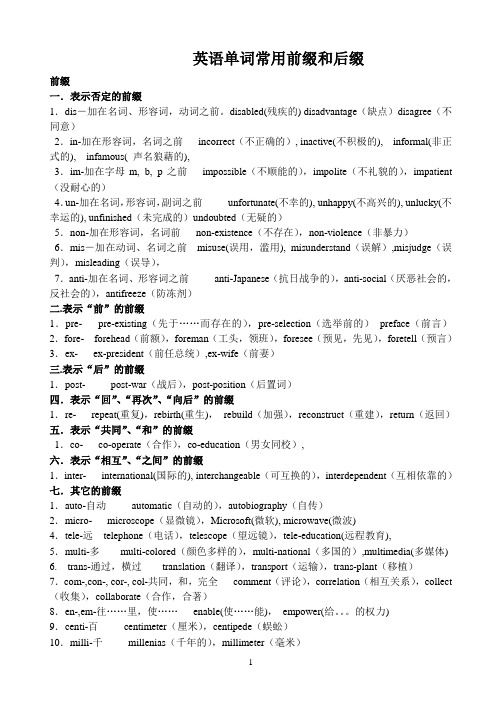
英语单词常用前缀和后缀前缀一.表示否定的前缀1.dis-加在名词、形容词,动词之前。
disabled(残疾的) disadvantage(缺点)disagree(不同意)2.in-加在形容词,名词之前incorrect(不正确的), inactive(不积极的), informal(非正式的), infamous( 声名狼藉的),3.im-加在字母m, b, p之前impossible(不顺能的),impolite(不礼貌的),impatient (没耐心的)4.un-加在名词,形容词,副词之前unfortunate(不幸的), unhappy(不高兴的), unlucky(不幸运的), unfinished(未完成的)undoubted(无疑的)5.non-加在形容词,名词前non-existence(不存在),non-violence(非暴力)6.mis-加在动词、名词之前misuse(误用,滥用), misunderstand(误解),misjudge(误判),misleading(误导),7.anti-加在名词、形容词之前anti-Japanese(抗日战争的),anti-social(厌恶社会的,反社会的),antifreeze(防冻剂)二.表示“前”的前缀1.pre- pre-existing(先于……而存在的),pre-selection(选举前的)preface(前言)2.fore- forehead(前额),foreman(工头,领班),foresee(预见,先见),foretell(预言)3.ex- ex-president(前任总统),ex-wife(前妻)三.表示“后”的前缀1.post- post-war(战后),post-position(后置词)四.表示“回”、“再次”、“向后”的前缀1.re- repeat(重复),rebirth(重生),rebuild(加强),reconstruct(重建),return(返回)五.表示“共同”、“和”的前缀1.co- co-operate(合作),co-education(男女同校),六.表示“相互”、“之间”的前缀1.inter- international(国际的), interchangeable(可互换的),interdependent(互相依靠的)七.其它的前缀1.auto-自动automatic(自动的),autobiography(自传)2.micro- microscope(显微镜),Microsoft(微软), microwave(微波)4.tele-远telephone(电话),telescope(望远镜),tele-education(远程教育),5.multi-多multi-colored(颜色多样的),multi-national(多国的),multimedia(多媒体) 6. trans-通过,横过translation(翻译),transport(运输),trans-plant(移植)7.com-,con-, cor-, col-共同,和,完全comment(评论),correlation(相互关系),collect (收集),collaborate(合作,合著)8.en-,em-往……里,使……enable(使……能),empower(给。
常见的英语前缀和后缀
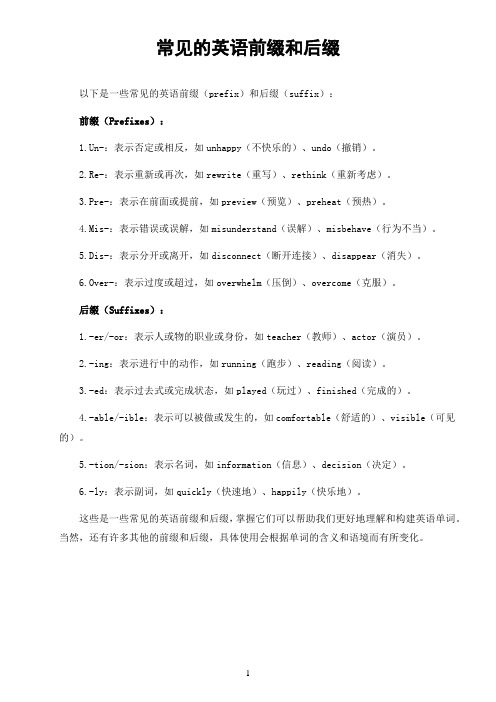
常见的英语前缀和后缀
以下是一些常见的英语前缀(prefix)和后缀(suffix):
前缀(Prefixes):
1.Un-:表示否定或相反,如unhappy(不快乐的)、undo(撤销)。
2.Re-:表示重新或再次,如rewrite(重写)、rethink(重新考虑)。
3.Pre-:表示在前面或提前,如preview(预览)、preheat(预热)。
4.Mis-:表示错误或误解,如misunderstand(误解)、misbehave(行为不当)。
5.Dis-:表示分开或离开,如disconnect(断开连接)、disappear(消失)。
6.Over-:表示过度或超过,如overwhelm(压倒)、overcome(克服)。
后缀(Suffixes):
1.-er/-or:表示人或物的职业或身份,如teacher(教师)、actor(演员)。
2.-ing:表示进行中的动作,如running(跑步)、reading(阅读)。
3.-ed:表示过去式或完成状态,如played(玩过)、finished(完成的)。
4.-able/-ible:表示可以被做或发生的,如comfortable(舒适的)、visible(可见的)。
5.-tion/-sion:表示名词,如information(信息)、decision(决定)。
6.-ly:表示副词,如quickly(快速地)、happily(快乐地)。
这些是一些常见的英语前缀和后缀,掌握它们可以帮助我们更好地理解和构建英语单词。
当然,还有许多其他的前缀和后缀,具体使用会根据单词的含义和语境而有所变化。
1。
英语词语前后缀
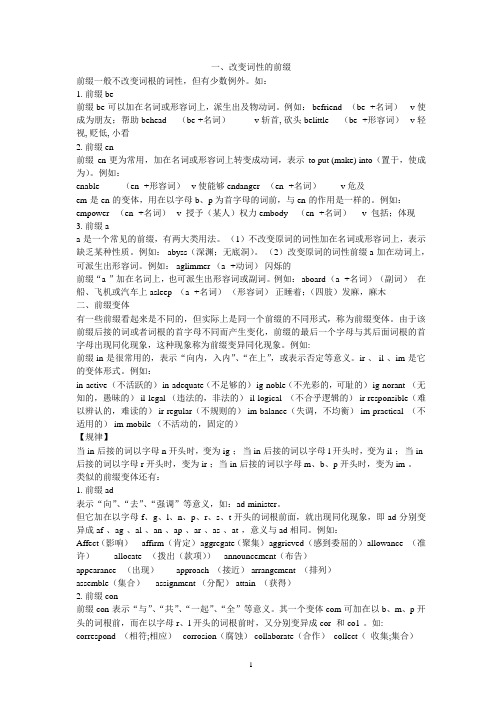
一、改变词性的前缀前缀一般不改变词根的词性,但有少数例外。
如:1. 前缀be-前缀be-可以加在名词或形容词上,派生出及物动词。
例如: befriend (be- +名词) v 使成为朋友;帮助 behead (be-+名词) v 斩首, 砍头 belittle (be- +形容词) v 轻视, 贬低, 小看2. 前缀en-前缀en-更为常用,加在名词或形容词上转变成动词,表示to put (make) into(置于,使成为)。
例如:enable (en- +形容词) v 使能够 endanger (en- +名词) v 危及em-是en-的变体,用在以字母b、p为首字母的词前,与en-的作用是一样的。
例如:empower (en- +名词) v 授予(某人)权力 embody (en- +名词) v 包括;体现3. 前缀a-a-是一个常见的前缀,有两大类用法。
(1)不改变原词的词性加在名词或形容词上,表示缺乏某种性质。
例如: abyss(深渊;无底洞)。
(2)改变原词的词性前缀a-加在动词上,可派生出形容词。
例如: aglimmer (a- +动词)闪烁的前缀“a-”加在名词上,也可派生出形容词或副词。
例如: aboard (a- +名词)(副词)在船、飞机或汽车上 asleep (a- +名词)(形容词)正睡着;(四肢)发麻,麻木二、前缀变体有一些前缀看起来是不同的,但实际上是同一个前缀的不同形式,称为前缀变体。
由于该前缀后接的词或者词根的首字母不同而产生变化,前缀的最后一个字母与其后面词根的首字母出现同化现象,这种现象称为前缀变异同化现象。
例如:前缀in-是很常用的,表示“向内,入内”、“在上”,或表示否定等意义。
ir-、 il-、im-是它的变体形式。
例如:in-active (不活跃的) in-adequate(不足够的) ig-noble(不光彩的,可耻的) ig-norant (无知的,愚昧的) il-legal (违法的,非法的) il-logical (不合乎逻辑的) ir-responsible(难以辨认的,难读的) ir-regular(不规则的) im-balance(失调,不均衡) im-practical (不适用的) im-mobile (不活动的,固定的)【规律】当in-后接的词以字母n开头时,变为ig-;当in-后接的词以字母l开头时,变为il-;当in-后接的词以字母r开头时,变为ir-;当in-后接的词以字母m、b、p开头时,变为im-。
英语单词前缀和后缀的分类初中
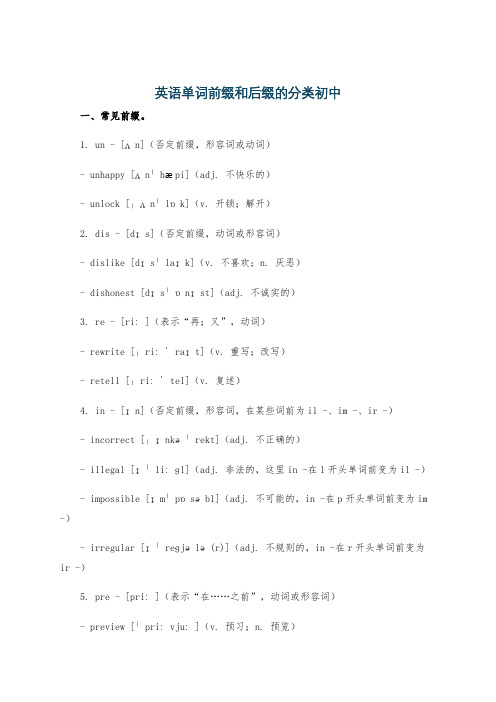
英语单词前缀和后缀的分类初中一、常见前缀。
1. un - [ʌn](否定前缀,形容词或动词)- unhappy [ʌnˈhæpi](adj. 不快乐的)- unlock [ˌʌnˈlɒk](v. 开锁;解开)2. dis - [dɪs](否定前缀,动词或形容词)- dislike [dɪsˈlaɪk](v. 不喜欢;n. 厌恶)- dishonest [dɪsˈɒnɪst](adj. 不诚实的)3. re - [riː](表示“再;又”,动词)- rewrite [ˌriːˈraɪt](v. 重写;改写)- retell [ˌriːˈtel](v. 复述)4. in - [ɪn](否定前缀,形容词,在某些词前为il -、im -、ir -)- incorrect [ˌɪnkəˈrekt](adj. 不正确的)- illegal [ɪˈliːɡl](adj. 非法的,这里in -在l开头单词前变为il -)- impossible [ɪmˈpɒsəbl](adj. 不可能的,in -在p开头单词前变为im -)- irregular [ɪˈreɡjələ(r)](adj. 不规则的,in -在r开头单词前变为ir -)5. pre - [priː](表示“在……之前”,动词或形容词)- preview [ˈpriːvjuː](v. 预习;n. 预览)- pre - war [ˈpriː wɔː(r)](adj. 战前的)二、常见后缀。
1. - er [ə(r)](表示“人或物”,名词)- teacher [ˈtiːtʃə(r)](n. 教师)- cleaner [ˈkliːnə(r)](n. 清洁工;清洁器)2. - or [ɔː(r)](表示“人或物”,名词)- actor [ˈæktə(r)](n. 男演员)- visitor [ˈvɪzɪtə(r)](n. 访问者;参观者)3. - ful [fʊl](形容词后缀,“充满……的”)- helpful [ˈhelpfʊl](adj. 有帮助的)- beautiful [ˈbjuːtɪfʊl](adj. 美丽的)4. - less [lɪs](形容词后缀,“无……的;少……的”)- homeless [ˈhəʊmlɪs](adj. 无家可归的)- careless [ˈkeəlɪs](adj. 粗心的)5. - ly [li](副词后缀,形容词 + ly变为副词)- quickly [ˈkwɪkli](adv. 迅速地)- carefully [ˈkeəfəli](adv. 仔细地)6. - tion [ʃn](名词后缀,动词 + tion变为名词)- action [ˈækʃn](n. 行动)- education [ˌedʒuˈkeɪʃn](n. 教育)7. - ing [ɪŋ](可作名词后缀表示“行为;事情”,也可作动词的现在分词形式)- reading [ˈriːdɪŋ](n. 阅读;v. read的现在分词)- running [ˈrʌnɪŋ](n. 跑步;v. run的现在分词)8. - ed [d]或[t]或[ɪd](动词的过去式和过去分词形式,也可作形容词后缀表示“感到……的”)- worked [wɜːkt](v. work的过去式和过去分词)- interested [ˈɪntrəstɪd](adj. 感兴趣的)。
最常见的单词前缀和后缀—归纳总结
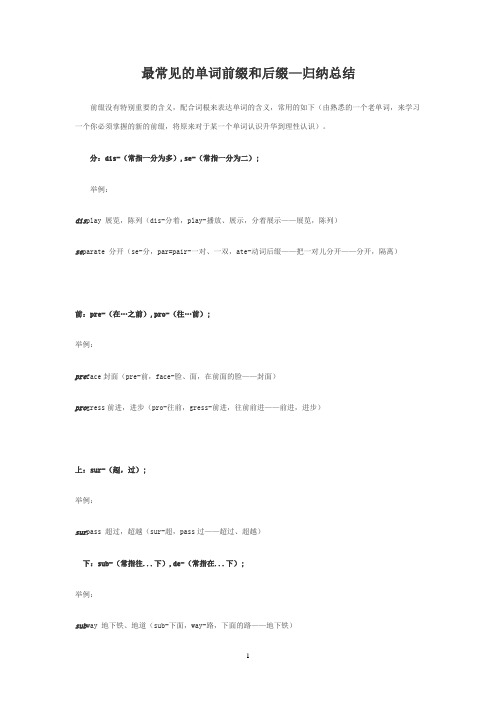
最常见的单词前缀和后缀—归纳总结前缀没有特别重要的含义,配合词根来表达单词的含义,常用的如下(由熟悉的一个老单词,来学习一个你必须掌握的新的前缀,将原来对于某一个单词认识升华到理性认识)。
分:dis-(常指一分为多),se-(常指一分为二);举例:dis play 展览,陈列(dis-分着,play-播放、展示,分着展示——展览,陈列)se parate 分开(se-分,par=pair-一对、一双,ate-动词后缀——把一对儿分开——分开,隔离)前:pre-(在…之前),pro-(往…前);举例:pre face封面(pre-前,face-脸、面,在前面的脸——封面)pro gress前进,进步(pro-往前,gress-前进,往前前进——前进,进步)上:sur-(超,过);举例:sur pass 超过,超越(sur-超,pass过——超过、超越)下:sub-(常指往...下),de-(常指在...下);举例:sub way 地下铁、地道(sub-下面,way-路,下面的路——地下铁)de lay 延迟、耽误(de-底下,lay-放,往底下放——延迟,耽误)不:a-,ab-, un-,dis-,im-(还有in/il/ir的版本);举例:a bound 丰富,大量(a-不,bound-板子,边界——无边无界、一望无垠,丰富,富饶)ab out 关注、关于、大约(ab-不,out-出去、离开,不出去,不离开——关注、关于、大约)un happy 不高兴(un-不,happy-高兴——不高兴)dis like 不喜欢(dis-不,like-喜欢——不喜欢)im mediately 立即地,直接地(im-不要,med-中间、中间环节,iately-复合的后缀,不要中间环节、一步到位——立即地,直接的)in correct 不正确的(in-不,correct-正确的——不正确的)il legal 不合法的(il-不,leg-词根:law, al-的——非法的)ir regular 不规则的(ir-不,regular-规则的)内:ac-(常指往...里),in-(常指在...里,也有im/il的版本);举例:ac cept 接受(ac-往里,cept-拿、取,往里面拿——接受)in side 在里面(in-在里,side-边、侧)im port 进口(im-进入,port-港口)il luminate 照明(il-进入,lumin-词根:光,ate-动词后缀,进入灯光——照明)共:com-(还有con/cor/col的版本), per-(具体指:“每一个”或者“一直”的意思); 举例:com pose 组成,构成(com-共同,pose-摆放,往共同的地方摆放——组成、构成)con nect 联系(con-共同,nect=neck-脖子,相同的脖子,拥有同一个脖子的——连接、联系)cor rect 正确的(cor-全都,rect-直立、直立着,全都是直立的——正确的)col lect 收集,收藏(col-全都,lect-挑选,全挑过来,全选过来——收集、收藏、集中)per son 人(per-每一个,son-儿子,人是上帝的每一个儿子,每个人也都是上帝之子)per fect 完美的(per-每一个,fect-做,制造,每一件事都做了——完美的)外:ex-,e-,es-;举例:ex it 出口、门(ex-往外,it-后缀,往外出的地方——出口、门)e lect 选举(e-往外,lect-挑选,往外挑选出来——选举)es say 散文、随笔(es-往外,say-说,随口而说——散文,随笔)反:re-(有反复、返回两个意思), op-(相对的);举例:re turn返回(re-往回,turn-转,往回转——返回)op pose对抗(op-相对,pose-摆放——在相对的位置摆放——对抗)难点两处:1,dis/ab/re- 三个前缀是难点,各有两种含义,要重点强化。
- 1、下载文档前请自行甄别文档内容的完整性,平台不提供额外的编辑、内容补充、找答案等附加服务。
- 2、"仅部分预览"的文档,不可在线预览部分如存在完整性等问题,可反馈申请退款(可完整预览的文档不适用该条件!)。
- 3、如文档侵犯您的权益,请联系客服反馈,我们会尽快为您处理(人工客服工作时间:9:00-18:30)。
“per- ”
word-forming element meaning "through, throughout; thoroughly; entirely, utterly," from Latin preposition per (see per (prep.)).
per (prep.)
1580s (earlier in various Latin and French phrases), from Latin per "through, during, by means of, on account of, as in," from PIE root *per- (1) "Base of prepositions and preverbs with the basic meanings of 'forward,' 'through,' and a wide range of extended senses such as 'in front of,' 'before,' 'early,' 'first,' 'chief,' 'toward,' 'against,' 'near,' 'at,' 'around'" [Watkins]. Cognates: Sanskrit pari- "around, about, through," pura "before, formerly;" Avestan pairi- "around," paro "before;" Old Persian pariy; Hittite para- "on, forth;" Greek peri "around, about, near, beyond," paros "before," para "from beside, beyond," pro "before;" Latin pro "before, for, on behalf of, instead of," porro "forward," prae "before;" Old English fore (prep.) "before, in front of;" (adv.) "before, previously;" German vor "for;" Old Church Slavonic pra-dedu "great-grandfather;" Russian pere"through;" Lithuanian per "through;" Old Irish air- Gothic fair-, German ver-, Old English fer-, intensive prefixes
semibefore vowels sem-, word-forming element meaning "half, part, partly; partial, imperfect; twice," from Latin semi- "half," from PIE *semi- "half" (cognates: Sanskrit sami "half," Greek hemi- "half," Old English sam-, Gothic sami- "half"). Old English cognate sam- was used in such compounds as samhal "poor health," literally "half-whole;" samsoden "half-cooked," figuratively "stupid" (compare half-baked); samcucu "half-dead," literally "half-alive;" and the last survivor of the group, sandblind "dim-sighted" (q.v.). Common in Latin (as in semi-gravis "half-drunk," semi-hora "half hour," semi-mortuus "half-dead," semi-nudus "half-naked," semi-vir "half-man, hermaphrodite"). The Latinderived form in English has been active in forming native words since 15c
Lithuanian pre "at," Old Church Slavonic pri "at," Gothic faura, Old English fore "before"), extended form of root *per- (1) "beyond, forward, through" (see per). The Latin word was active in forming verbs. Also see prae-. Sometimes in Middle English muddled with words in pro- or per-
para- (1) before vowels, par-, word-forming element meaning "alongside, beyond; altered; contrary; irregular, abnormal," from Greek para- from para (prep.) "beside, near, issuing from, against, contrary to," from PIE *prea, from root *per- (1) "forward, through" (see per). Cognate with Old English for- "off, away." para- (2) Look up para- at word-forming element meaning "defense, protection against; that which protects from," from Italian para, imperative of parare "to ward off," from Latin parare "make ready" (see pare)
The common modern sense "in favor of, favoring" (pro-independence, pro-fluoridation, pБайду номын сангаасo-Soviet, etc.) was not in classical Latin and is attested in English from early 19c.
“pro- ”
word-forming element meaning "forward, forth, toward the front" (as in proclaim, proceed); "beforehand, in advance" (prohibit, provide); "taking care of" (procure); "in place of, on behalf of" (proconsul, pronoun); from Latin pro "on behalf of, in place of, before, for, in exchange for, just as," which also was used as a prefix.
fore (adv., prep.) Old English fore (prep.) "before, in front of, in presence of; because of, for the sake of; earlier in time; instead of;" as an adverb, "before, previously, formerly, once," from Proto-Germanic *fura "before" (cognates: Old Saxon fora, Old Frisian fara, Old High German fora, German vor, Danish for, Old Norse fyrr, Gothic faiura "for"), from PIE *prae-, extended form of root *per- (1) "forward, through" (see per). Now displaced by before. In nautical use, "toward the bows of the ship." Merged from 13c. with the abbreviated forms of afore and before and thus formerly often written 'fore. As a noun, "the front," from 1630s. The warning cry in golf is first recorded 1878, probably a contraction of before.
